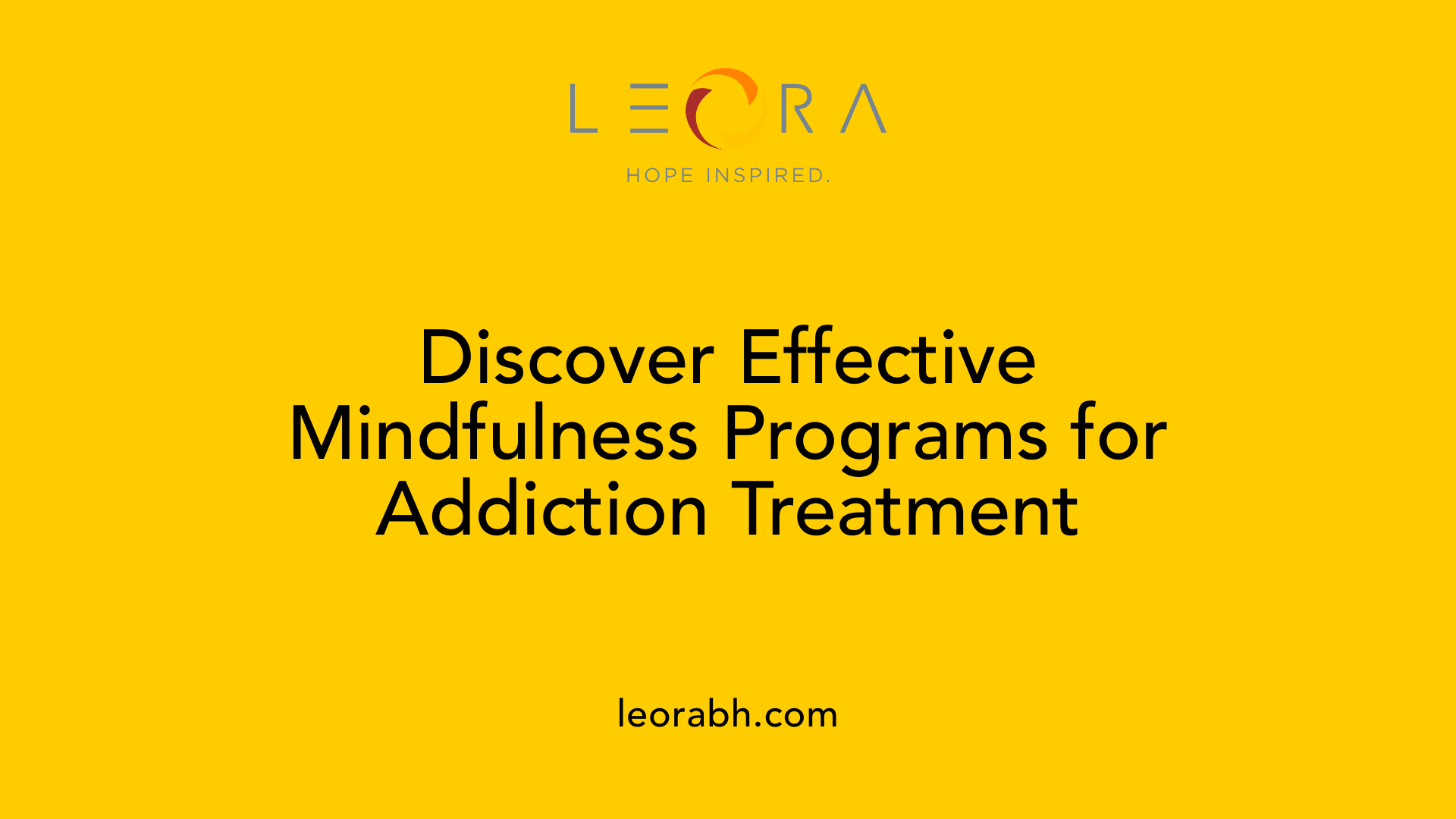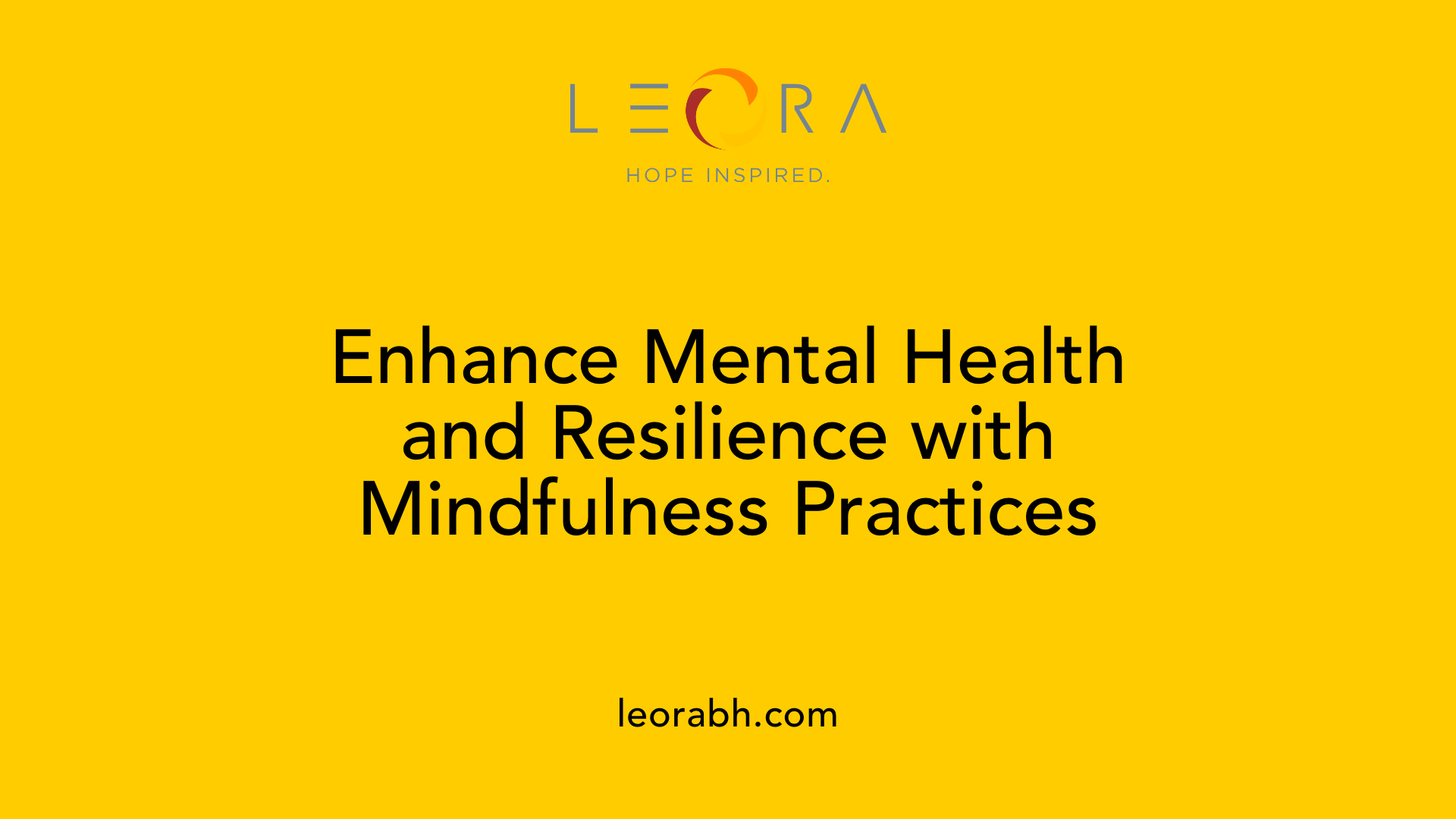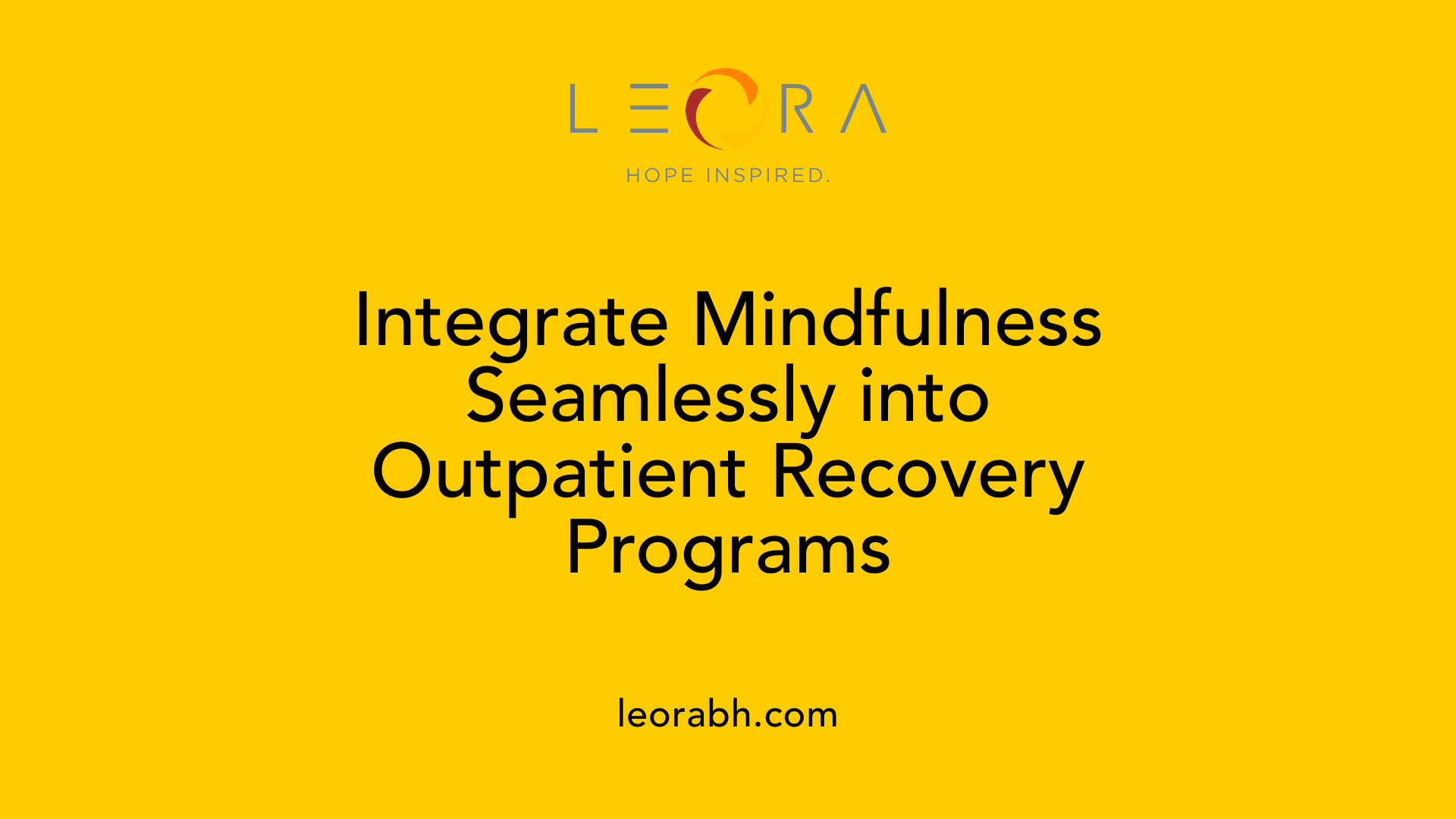How mindfulness and meditation support outpatient recovery
Harnessing Mindfulness and Meditation for Lasting Sobriety
Introduction to Mindfulness and Meditation in Outpatient Recovery
In recent years, mindfulness and meditation have emerged as powerful adjuncts to traditional outpatient addiction treatment programs. These practices help individuals build resilience, manage stress, and recognize triggers early, facilitating sustained recovery. Their integration into outpatient care enhances emotional regulation, boosts cognitive function, and supports trauma recovery, making them essential components of holistic treatment approaches.
Understanding the Core Principles of Mindfulness and Meditation
What is mindfulness?
Mindfulness is a special quality of being fully present and aware in the moment. It involves observing thoughts, feelings, bodily sensations, and the environment without judgment. Cultivated over time through dedicated practice, mindfulness helps individuals become more aware of their internal experiences and surroundings. This awareness allows for clearer recognition of triggers, cravings, and emotional states, which is especially beneficial in recovery from substance use disorders.
What is meditation?
Meditation is a structured practice that aims to calm the mind and develop mental stability. It often includes focused attention—such as concentrating on the breath or a mantra—and relaxation techniques like body scans or guided imagery. Meditation can take many forms, including loving-kindness meditation, mindful breathing, or movement-based practices like yoga. Regular meditation not only promotes relaxation but also enhances emotional regulation and self-control, supporting long-term recovery.
What are the key components of mindfulness meditation?
Mindfulness meditation involves three fundamental elements:
- Intention: Setting a clear purpose for your practice, such as cultivating calm or clarity.
- Acceptance: Embracing whatever thoughts, feelings, or sensations arise during meditation without resistance or judgment.
- Non-judgment: Observing your internal experiences objectively, without criticizing yourself or creating labels.
These components work together to help individuals develop a gentle, compassionate relationship with their inner experiences. In addiction recovery, this approach aids in recognizing early signs of cravings or emotional distress and responding with thoughtful, non-reactive choices.
Why are these principles important?
Understanding and practicing these core aspects of mindfulness and meditation can lead to significant brain changes, enhancing areas responsible for self-awareness, emotional regulation, and stress management. For those battling addiction, cultivating mindfulness fosters resilience, supports relapse prevention, and promotes overall well-being. Incorporating these principles into daily routines forms a foundation for sustainable recovery and a healthier relationship with oneself.
Neuroscientific Foundations of Mindfulness in Addiction Recovery

How does mindfulness affect brain function related to addiction?
Mindfulness practices target key neurocognitive mechanisms such as reward learning, stress regulation, and executive functioning. Neuroimaging studies demonstrate that mindfulness can increase activation in brain regions responsible for cognitive control, notably the prefrontal cortex. Simultaneously, mindfulness reduces reactivity to drug-related cues, which helps individuals manage cravings and automatic substance use behaviors more effectively.
What brain changes are associated with mindfulness training?
Training in mindfulness is linked to significant structural and functional brain changes. It enhances activity and connectivity in regions involved in sensory processing, emotional regulation, and self-awareness. These changes reinforce neural pathways linked to impulse control and emotional resilience, essential components for maintaining sobriety and preventing relapse.
Why is neuroplasticity important for recovery?
Neuroplasticity—the brain’s ability to rewire itself—is fundamental in the recovery process. It allows the brain to adapt positively by strengthening circuits that support self-control, emotional stability, and reward responsiveness. Such adaptive changes foster long-term sobriety, as they help recover from the neural dysregulation caused by addiction.
This evolving understanding underscores the role of mindfulness not only in managing immediate cravings but also in facilitating lasting brain changes that promote recovery. As research continues, embracing mindfulness-based interventions can be a scientifically supported approach to rewire the addicted brain towards healthier functioning.
Clinical Applications and Effectiveness of Mindfulness-Based Interventions (MBIs)
 Several mindfulness-based interventions have gained popularity in outpatient addiction treatment settings. Examples include Mindfulness-Based Relapse Prevention (MBRP), Mindfulness-Oriented Recovery Enhancement (MORE), Mindfulness-Based Cognitive Therapy (MBCT), and Mindfulness-Based Stress Reduction (MBSR). These programs are designed to help individuals manage cravings, regulate emotions, and increase self-awareness.
Several mindfulness-based interventions have gained popularity in outpatient addiction treatment settings. Examples include Mindfulness-Based Relapse Prevention (MBRP), Mindfulness-Oriented Recovery Enhancement (MORE), Mindfulness-Based Cognitive Therapy (MBCT), and Mindfulness-Based Stress Reduction (MBSR). These programs are designed to help individuals manage cravings, regulate emotions, and increase self-awareness.
MBIs work by targeting neurocognitive mechanisms such as automatic responses and stress reactivity. Techniques like urge surfing teach clients to ride out cravings without acting on them, while practices to increase awareness of automatic behaviors help in recognizing early triggers. Additionally, stress reduction exercises lower the body's reactivity, which is crucial since stress often precipitates relapse.
Empirical evidence supports the effectiveness of these practices. Meta-analyses and clinical studies have shown that regular mindfulness practice leads to reductions in substance use, cravings, and addiction-related symptoms. For example, research from USC highlights that an eight-week mindfulness training not only decreased stress and craving levels but also improved the likelihood of remaining abstinent over time. These findings validate mindfulness as a valuable complementary approach in addiction recovery, helping individuals develop healthier coping methods and enhance their resilience against relapse.
Practical Techniques for Supporting Recovery Through Mindfulness and Meditation
Practitioners can implement various mindfulness techniques to support recovery from substance use and mental health challenges. Guided meditation, body scans, and mindful breathing are among the most popular methods. Guided meditation involves listening to recorded or live instructions that guide individuals through calming, focused attention exercises. The body scan technique directs attention sequentially through different parts of the body, helping to release tension and enhance body awareness. Mindful breathing focuses on observing the breath—its inflow and outflow—to anchor the mind in the present moment.
These practices can be easily incorporated into daily routines. Many recommend engaging in formal sessions lasting between 10 and 30 minutes daily, as this consistency is linked to better recovery outcomes. However, the frequency of practice appears to be more crucial than session length alone. Regular daily practice helps reinforce emotional regulation and reduces stress.
In addition to dedicated meditation sessions, mindfulness can be integrated into everyday activities. For example, practicing mindful eating involves paying full attention to the taste, texture, and sensations of food. Walking meditation encourages awareness of movement and surroundings, turning a routine activity into a calming practice. Establishing routines such as gratitude journaling or breathing exercises during breaks can help cultivate ongoing present-moment awareness.
Other simple techniques include using mindfulness apps that offer guided sessions, engaging in mindful chores to stay grounded, and setting intentional pauses throughout the day for deep breathing. These approaches foster resilience by creating moments of calm and clarity, crucial for managing cravings and emotional triggers during recovery.
Supporting Emotional and Mental Well-being with Mindfulness and Meditation

What are the mental health benefits of mindfulness?
Mindfulness practices can significantly improve emotional well-being by enhancing emotional regulation and reducing mental health symptoms such as stress, anxiety, and depression. Regular mindfulness activities, like focused breathing or body scans, help individuals stay present and accept their thoughts and feelings without judgment. This acceptance fosters resilience, allowing people to cope better with life's challenges. Furthermore, mindfulness has been shown to support trauma recovery, helping individuals process difficult emotional experiences in a safe and controlled way.
How does mindfulness aid in trauma recovery?
Trauma-sensitive mindfulness approaches can be particularly effective in addressing post-traumatic stress disorder (PTSD) symptoms. Higher levels of mindfulness are linked with fewer PTSD symptoms and improved emotional regulation. By cultivating non-judgmental awareness, individuals learn to observe traumatic memories and emotional responses without becoming overwhelmed. Mindfulness practices such as gentle meditation or mindful movement help process traumatic experiences safely, reducing their intensity and fostering resilience.
Can mindfulness improve resilience?
Yes, mindfulness clearly contributes to building resilience. It teaches individuals to accept their circumstances instead of reacting impulsively, which can lessen the impact of stressors. By developing greater self-awareness and compassion, people learn to manage their emotional responses more effectively. Mindfulness encourages a friendly, accepting attitude towards oneself, promoting mental strength and adaptability in facing adversity.
Incorporating mindfulness and meditation into daily routines can serve as powerful tools for supporting mental health. These practices not only help to reduce immediate stress and anxiety but also strengthen the mind's capacity to recover from trauma and handle future challenges more effectively.
Mindfulness, Meditation, and Outpatient Programs: Practical Integration and Benefits
 In outpatient addiction treatment settings, mindfulness and meditation are increasingly recognized as vital components that support recovery. Programs such as Kemah Palms Recovery integrate these practices through structured modules like guided meditation, yoga, and cognitive behavioral approaches. Patients are encouraged to practice regularly, often daily, whether through formal sessions or informal mindfulness activities like mindful breathing and gratitude exercises. This routine helps develop self-awareness, manage cravings, and reduce stress, all crucial during early recovery stages.
In outpatient addiction treatment settings, mindfulness and meditation are increasingly recognized as vital components that support recovery. Programs such as Kemah Palms Recovery integrate these practices through structured modules like guided meditation, yoga, and cognitive behavioral approaches. Patients are encouraged to practice regularly, often daily, whether through formal sessions or informal mindfulness activities like mindful breathing and gratitude exercises. This routine helps develop self-awareness, manage cravings, and reduce stress, all crucial during early recovery stages.
Peer support plays a central role in enhancing mindfulness-based recovery efforts. Communities like Recovery Dharma provide a social platform where individuals can share experiences, reinforce their practice, and draw strength from collective support. This perceived social backing not only boosts motivation but also increases recovery capital—the resources and resilience needed for sustained sobriety. Peer groups promote accountability, helping members stay committed and consistent with mindfulness activities.
Community involvement extends beyond peer groups and into local support networks and recovery groups. Participation in community events or group therapy sessions fosters a sense of belonging, shared purpose, and collective accountability. These interactions reinforce mindfulness principles and create a supportive environment conducive to long-term sobriety. Overall, integrating mindfulness practices into outpatient programs, bolstered by peer and community support, bolsters emotional resilience, builds healthy habits, and ultimately improves recovery outcomes.
Conclusion: Moving Towards Sustainable Recovery with Mindfulness and Meditation
 Mindfulness and meditation have shown profound benefits in supporting long-term recovery from substance use disorders (SUDs). These practices improve emotional regulation, enhance self-awareness, and foster resilience, essential elements for maintaining sobriety. Regular engagement with mindfulness activities like breathing exercises, body scans, and guided meditation can lead to structural brain changes, strengthening areas responsible for impulse control and stress management.
Mindfulness and meditation have shown profound benefits in supporting long-term recovery from substance use disorders (SUDs). These practices improve emotional regulation, enhance self-awareness, and foster resilience, essential elements for maintaining sobriety. Regular engagement with mindfulness activities like breathing exercises, body scans, and guided meditation can lead to structural brain changes, strengthening areas responsible for impulse control and stress management.
The long-term outcomes of integrating mindfulness into addiction treatment include reduced cravings, lower stress reactivity, and increased mental clarity. This not only supports relapse prevention but also encourages personal growth by deepening self-compassion, promoting emotional stability, and fostering a sense of purpose. Many individuals find that mindfulness helps them develop healthier responses to life's challenges, reinforcing behaviors aligned with their recovery goals.
Spirituality often intertwines with mindfulness, providing a sense of connection, meaning, and inner peace. This spiritual dimension can be a vital source of strength during difficult times, helping individuals find purpose beyond substance use. Incorporating spiritual practices alongside mindfulness creates a holistic approach to healing, emphasizing inner peace and emotional well-being.
Research indicates that ongoing mindfulness practice can enhance recovery outcomes by building a stable foundation for mental health. Scientific studies increasingly support the future role of mindfulness and meditation in comprehensive treatment plans, suggesting that their benefits extend beyond initial recovery phases. As research progresses, new techniques and tailored programs are expected to further improve support for those seeking sustainable sobriety.
Ultimately, the combination of mindfulness, meditation, and personal growth can transform recovery into a deeply fulfilling journey marked by improved well-being, emotional resilience, and a stronger connection to oneself and others.
Final Thoughts: Embracing Mindfulness for a Lifelong Journey of Sobriety
Integrating mindfulness and meditation into outpatient recovery programs offers a comprehensive approach that addresses the psychological, emotional, and spiritual facets of addiction. These practices empower individuals to become more present, regulate their responses, and cultivate resilience, setting the foundation for lasting change. As scientific research continues to validate their efficacy, mindfulness and meditation stand poised to transform addiction treatment, supporting individuals not only in overcoming dependence but also in fostering overall well-being and personal growth for a healthier, substance-free life.
References
- Mindfulness meditation in the treatment of substance use disorders ...
- 5 Mindfulness Practices for Addiction Recovery | Hazelden Betty Ford
- The role of mindfulness, meditation, and peer support in recovery ...
- How Can Meditation and Mindfulness Help the Recovery Process?
- What Is Mindfulness Meditation and How Does It Help Recovery?
- Using Mindfulness and Meditation in Addiction Treatment | Arrowwood
- Northern California Mindfulness Meditation and Addiction Recovery
- Meditation For Addiction Recovery: Types & How To Start
- Mindfulness Could Be a Key to Recovering From Substance Abuse
- Mindfulness & Meditation Therapy In Addiction Treatment
Find Your Inner Light
Related Articles
Schedule an Assessment
Leora Behavioral Health provides comprehensive treatment services, including ambulatory detox, mental health IOP, and SUD IOP, to support your journey toward lasting recovery.
Our caring team will guide you through the admissions process and create a personalized treatment plan tailored to your unique needs. We welcome walk-ins. If you or a loved one is struggling, reach out today. We’re here to help.


.svg)




.svg)
.svg)
.svg)
.svg)
